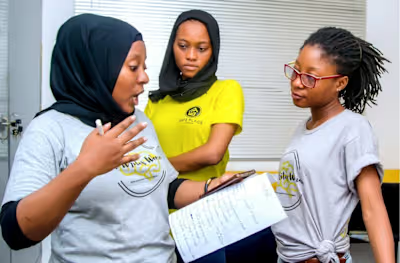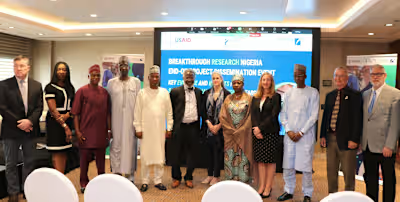Mitigating internal displacement, one skilled woman at a time
Like this project
Posted Jan 9, 2024
A showcase on how a non-profit trains interested women in basic money-making skills of their choosing, to mitigate the effects of internal displacement.
Likes
0
Views
0
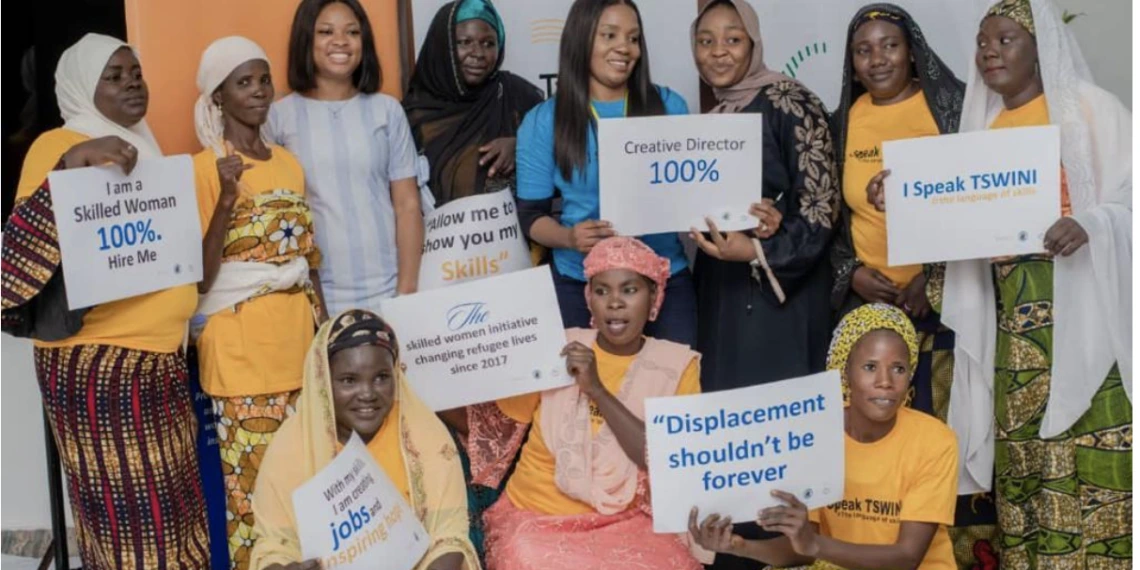
By Folakemi Ajala
On May 14, 2013, the Nigerian President at the time, Goodluck Jonathan declared a state of emergency in Borno, Adamawa, and Yobe states. This was necessitated by the growing insurgency and violent attacks on citizens and state assets in these states by the terrorist group, Boko Haram. Amidst the myriad problems brought on by the activities of the insurgents, one of the longest-lasting is displacement.
Internal displacement always leads to the loss of livelihoods, which in turn limits access to decent shelter, healthcare, and education. It also jeopardises security and social life.
At the end of 2021, Nigeria had 3.2 million internally displaced persons (IDPs) scattered in camps across the nation, making her the country with the third-highest number of internally displaced persons in Africa. In the capital city of Abuja, there are an estimated 10,000 internally displaced persons in over four IDP camps.
In 2017, Chisom Nwankwo, a fashion accessories designer and maker, needed hands for her side business. A friend suggested that she visit the Durumi IDP Camp in Area One, FCT, and train one of the girls there. Mrs. Nwankwo agreed, and what was intended to be a one-time training for a few girls, grew into The Skilled Women Initiative (TSWINI), an organisation which was registered in 2018.
THE WHY
One of the biggest problems that internally displaced persons face is unemployment, TSWINI is working to reduce the impact of this problem by giving the women the skills they need to be able to provide for themselves. “Displacement shouldn’t take forever. So, for me, it’s about the future. What values are the children getting? How will they grow and integrate into society with other children? How do you help the (disadvantaged) children? You empower the mothers.” Mrs. Nwankwo says.
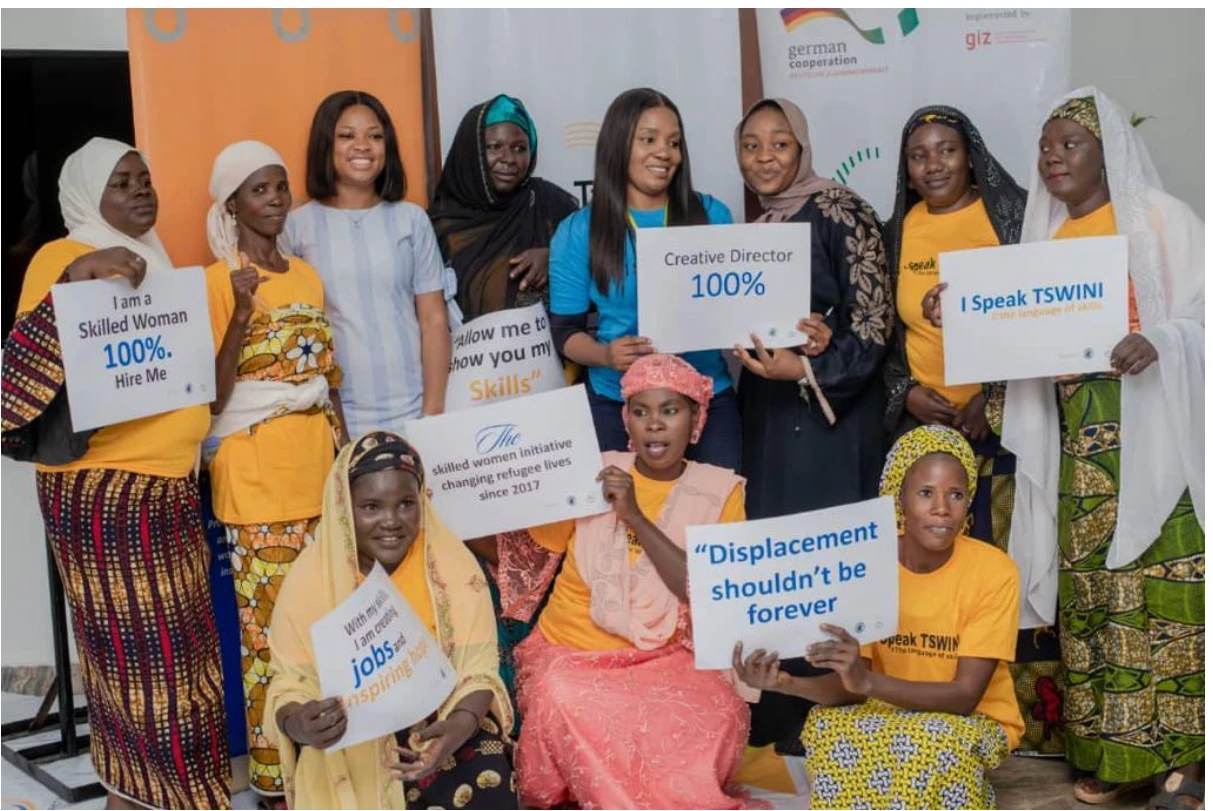
The women of The Skilled Women Initiative. Source: The Skilled Women Initiative (TSWINI)
The goal of TSWINI is to get the women to a place of financial independence so that they’re able to leave the camp and become productive members of society once more.
THE CYCLE OF LIFE…TRAINING
Every year, TSWINI trains up to 500 IDP camp residents in 6 different skills: sewing, upcycling, soap making, crocheting, briquette making, and production of fashion accessories, according to TSWINI’s Project Coordinator, Prisca Amanze.
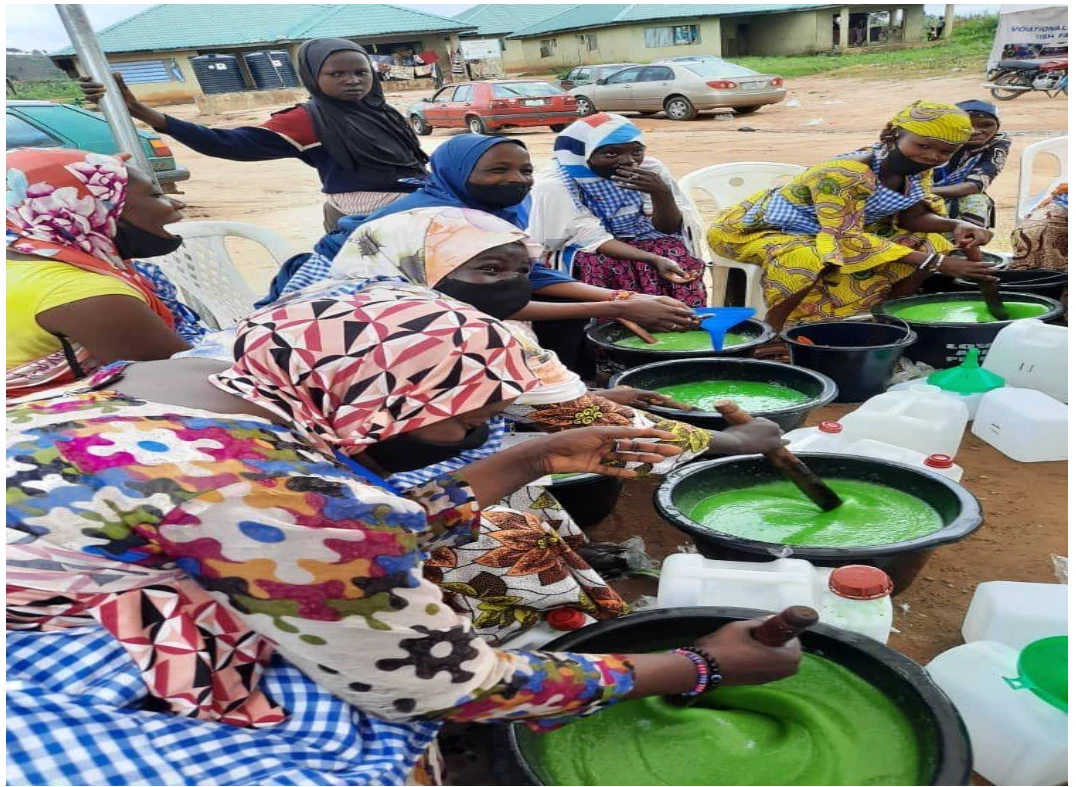
Learning the science of soap making. Source: The Skilled Women Initiative (TSWINI)
The training takes place in a cycle which begins with camp identification. This typically takes a month, where the team gathers data about the number of women who have any skills and those who wish to acquire skills. The target demographic is 18-30 years old. TSWINI found it necessary to work within this age range because they have discovered that this age group are the ones with the most zeal and stamina and are more likely to follow through with the program. It is during the camp identification process that a training centre is set up.
TSWINI then goes on to hold psychosocial meetings with the women who have indicated interest in the training, so they can better understand how they think, what their expectations are, and what future aspirations they have.
Depending on which one was chosen, skills training lasts anywhere from 1-3 months and takes place in the training centre.
It is important for the women to understand how to run a business, so for 2 weeks, TSWINI, in partnership with Deutsche Gesellschaft für Internationale Zusammenarbeit GmbH (aka GIZ) provides entrepreneurship training on important subjects like, proper pricing of their products; product promotion; needs and wants assessment; book and record keeping; and savings.
The next step is market placement. Here, the women are placed with mentors (women who are already practising in their field) in different parts of the city. This is where they see the practical side of the entrepreneurial lessons, and gain knowledge on how to run a business. This runs for three weeks.
Digital marketing is still a very effective way to reach more customers, so the women are taught how to use WhatsApp and Facebook to market their products.
At the end of this cycle, GIZ supports the women with equipment that’s domiciled at the training centre; this is to help them resist the temptation to sell the equipment for a quick buck.
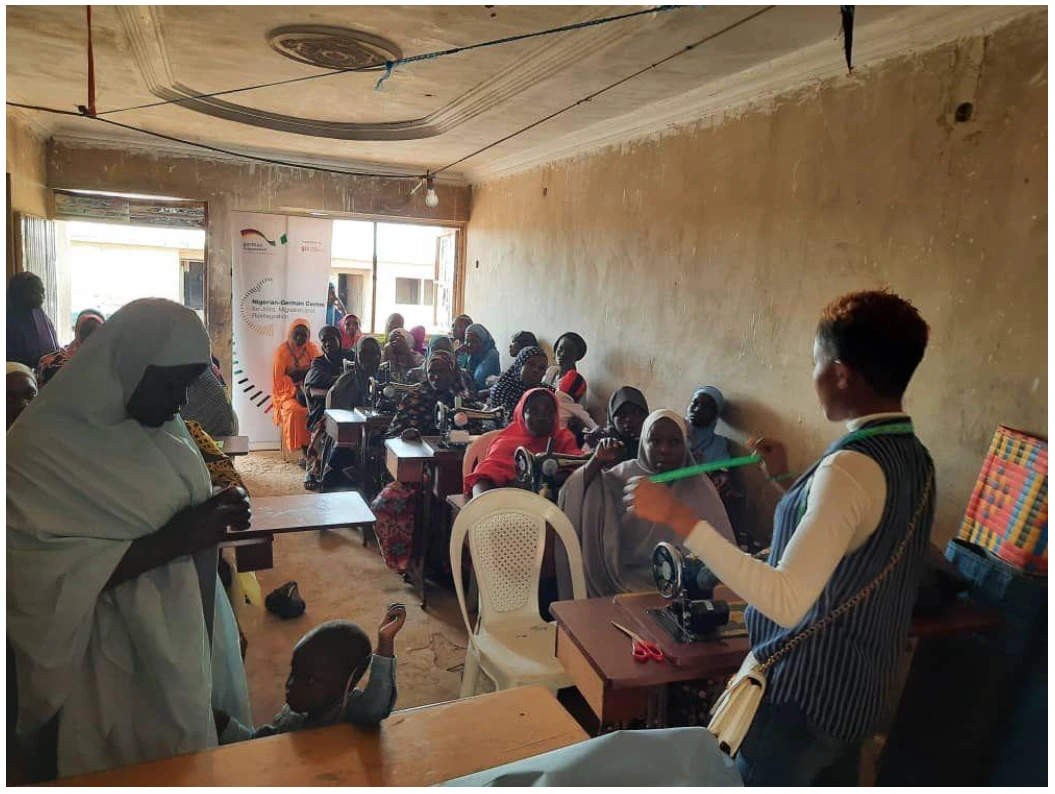
Tailoring class at the training centre. Source: The Skilled Women Initiative (TSWINI)
As a result of the location of the IDP camps, access to market is still a bit of a challenge, so TSWINI helps to source for, and direct business to the trained women in a scheme they call, ‘Cash-4-Work’. TSWINI is also building the capacity of the women to sell.
HITCHES ALONG THE WAY
At the onset of the training program, all the donated sewing machines were stolen, and operations almost ground to a halt. However, some of Mrs Nwankwo’s friends rallied and donated five sewing machines. This time, TSWINI let the camp residents know that they were going to be held responsible for the safety of the training equipment, if they were going to continue the program. It worked. No equipment has been stolen since then.
Most members of the TSWINI team don’t speak Hausa, which is the major language spoken in the camp, and this was a huge barrier until interpreters were hired. Security issues also pose a challenge to their work, as they’ve wanted to do some work in Nasarawa for a while but are unable to.
In 2020, TSWINI won Guaranty Trust Holding Company Plc’s Simple Change, Big Impact Challenge that had a ₦1 million grant attached to it. The grant was used to buy sewing machines and a generator, and part of the funds was also used to set up a training centre in the Durumi Camp. There are currently 120 sewing machines in the Durumi camp.
Though up to 500 women sign up at the beginning of the cycle, not all of them complete the training. Some of those who do complete the training, don’t follow through with setting up their business, and sell the equipment or supplies they were provided with, only to want to sign up for the next cycle. This consumes time and takes up resources that could be dedicated to others who are in need.
MOVING ON UP, AND OUT
Zara Mohammed is a mother of four who hails from Bama LGA in Borno State. The Boko Haram insurgency forced her and her family to flee their village in 2013, and they first settled in the Durumi camp, and then in the Kabusa camp. Mrs Mohammed learned crocheting, baking, and tailoring, but decided to focus on tailoring.
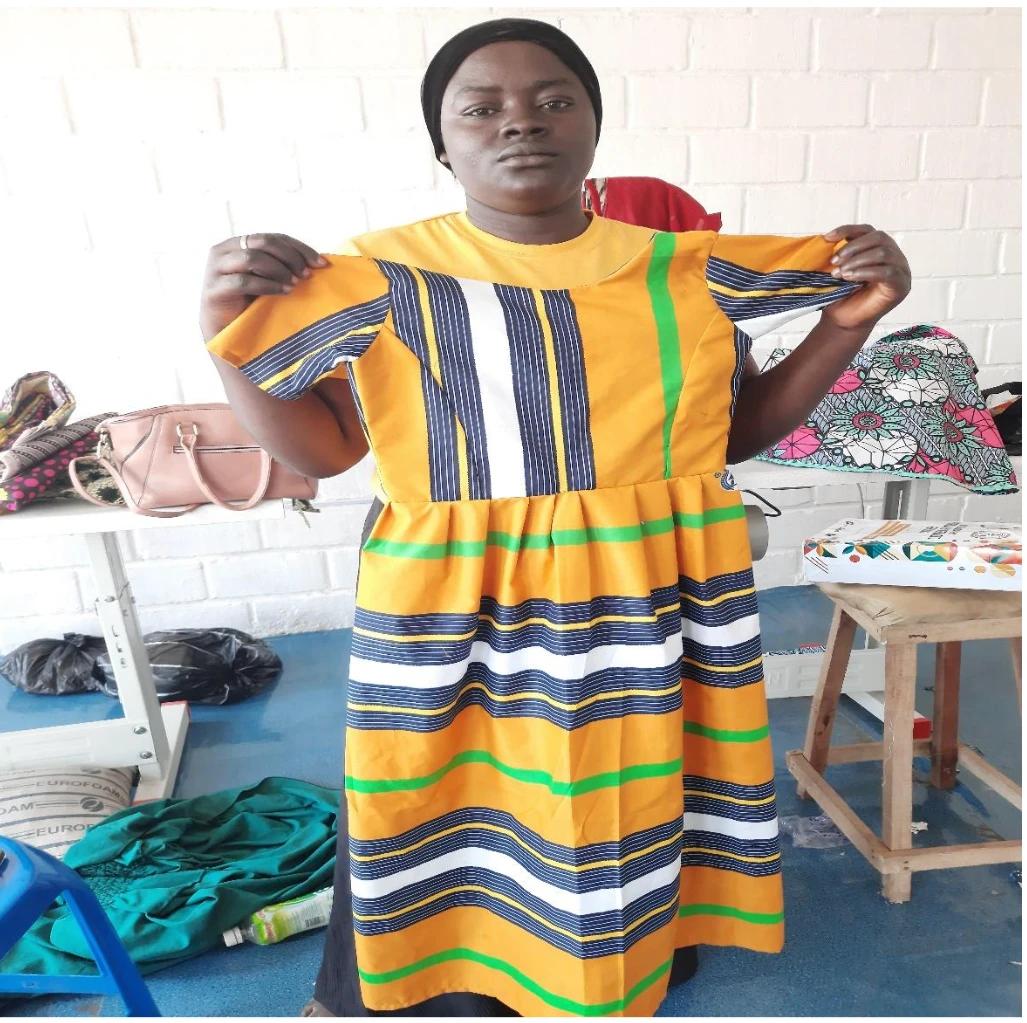
A simple dress made by Zara Mohammed. Source: Folakemi Ajala.
“Before the training, we just sit around, waiting for people to ‘dash’ us food. Now, I can pay my children’s school fees from the money I make in this shop.” Mrs Mohammed says.
Ladi Ayuba makes an average of 10-15 thousand naira per month from the dresses she makes and sells and can send her two children to school.
Mrs Mohammed and Mrs Ayuba are two of 18 women who have completed the training cycle and are now beneficiaries of the TSWINI Impact Fund. These women agreed to the criteria that they transition out of the camp within one year, which will elapse in August 2023. The women have a shared working space in Kaura Modern Market and have a cooperative savings account towards house rent that TSWINI monitors.
TSWINI Impact Fund. Source: The Skilled Women Initiative (TSWINI)
These 18 women are married, and they cannot make the transition without the consent of their husbands. How did TSWINI get their buy in?
“The relationship we have with the men is built on trust. We do what we say we’ll do. If we say we’re providing the women with smartphones or sewing machines, we do. Over time, they’ve seen that our actions match our words, and they see the impact of the skills their wives have learned, so it was easy for them to get on board,” Mrs Nwankwo says.
TSWINI is careful to not paint a rosy picture of what life outside of camp is like. Though they may no longer get the occasional free handout and would need to make their own way, they would have their lives, livelihood and dignity back.
At work in the shared working space. Source: Folakemi Ajala
CONCLUSION
The simplicity of TSWINI’s work is part of what makes it impactful. They train interested women in basic money-making skills of their choosing. When the women show dedication to their chosen skill, the impact is seen, and this serves as a billboard for other women.
This story was made possible by Nigeria Health Watch, with support from the Solutions Journalism Network, a nonprofit organization dedicated to rigorous and compelling reporting about responses to social problems. http://solutionsjournalism.org.



